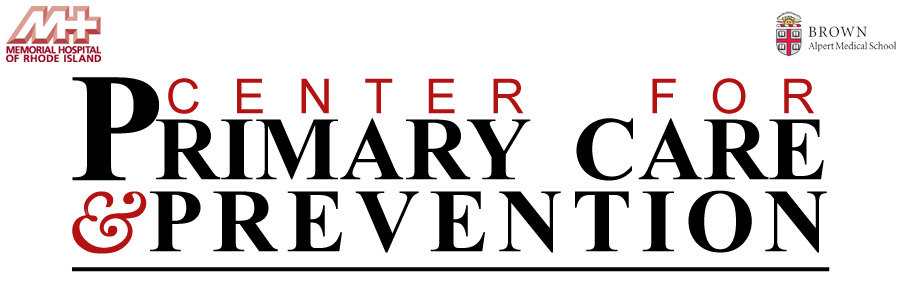Current Research Grants

1. Colorectal Cancer Decision Aids in Primary Care
Joseph Diaz, MD. National Institutes of Health Grants
Colorectal cancer screening rates are low, especially among Latinos with limited English proficiency. "Positive deviants" or "successful peers" are those individuals in a community who practice a healthy behavior (e.g. colorectal cancer screening) when the majority do not. This project will use a "positive deviance" approach to create a culturally and linguistically appropriate innovative personalized video intervention to promote colorectal cancer screening among Spanish-speaking Latino men.
More Info | Back to Top
2. Emergency Department Safety Assessment and Follow-up Evaluation (ED-SAFE)
Lisa Uebelacker, PhD, National Institute of Mental Health
The NIMH's RFA-Suicide Prevention in Emergency Medicine Deparments recognizes the emergency department (ED) as an important setting to increase suicide detection and prevention efforts but observes that evidence-based practice guidelines do not exist. In response, we have designed the ED Safety Assessment and Follow-Up Evaluation (EDSAFE) trial. Two inter-related studies will be conducted using a quasi-experimental design appropriate for studying systems-based change. The studies will share three phases of data collectoin: Treatment as Usual, Screening Alone, and Intervention. During each phase, 472 suicidal patients (1,416 total) will be enrolled and followed using multiple methods for 12 months.
More Info | Back to Top
3. Methods for Understanding Sentinel Events
Jennifer Clarke, MD, NIH/NIDA
We seek to better delineate the cognitive and affective mechanisms of action that mediate between a sentinel event (incarceration or "a teachable moment") and behavior change by developing measures of these constructs that can be administered in a jail. Such measures should aide in drug treatment for incarcerated men and women.
More Info | Back to Top
4. MI: Empowering Women to Make Contraceptive Choices While Incarcerated
Jennifer Clarke, MD, NIH/NICHHD
Women entering jail usually have very brief periods of incarceration and are at high risk for unplanned pregnancies and STIs after release. We propose to evaluate an innovative motivationally based intervention in a randomized clinical trial of women entering jail in Rhode Island.
More Info | Back to Top
5. Osteoarthritis Initative and Extension
Charles Eaton, MD. National Institutes of Health
Knee osteoarthritis (OA) is the most common cause of disability in adults. The "Osteoarthritis Initative (OAI): A Knee Health Study" is a nationwide research study that will help researchers gather more information about the physical changes that occur prior to the onset of arthritis symptoms or before OA gets worse. The purpose of this study is to examine people who have knee OA or are at high risk for knee OA; information will be used to better understand how to prevent and treat knee OA.
More Info | Back to Top
6. Pilot Study of Home Blood Pressure Control Program (eBPcontrol)
Charles Eaton, MD, AHRQ
This intervention study will evaluate the feasibility,acceptability and effectiveness of an e-health enabled model of care by randomly assigning a trained patient navigator and/or a blood pressure (BP) self-management web portal to patients with uncontrolled hypertension after a run in period with a home BP monitor (HBPM) and comparing the results on blood pressure control. We anticipate that patients receiving the combination of a patient navigator(PN)with a self-management web portal and home BP monitor will have better BP control than when the only received a home BP monitor.
More Info | Back to Top
7. Psychosocial Treatment Development for Depression with Comorbid Chronic Pain
Lisa Uebelacker PhD & Risa Weisberg PhD, National Institues of Health
In this pilot trial, primary care patients with depression and chronic low back pain are randomly assigned to receive either depression care management or depression care management + primary care counseling for living a full life with pain and depression.
Back to Top
8. Sustaining Tobacco Abstinence after Incarceration
Jennifer Clarke, MD. National Institutes of Health/National Institute on Drug Abuse
The purpose of this study is to determine the extent to which an Intentional Behavioral Intervention will increase tobacco quit rates post release among incarcerated men and women.
More Info | Back to Top
9. Tailored Lifestyle Invervention in Obese Adults within Primary Care Practice (Choose to Lose)
Charles Eaton, MD. National Institutes of Health/National Institute of Diabetes and Digestive and Kidney Diseases
The primary objective of the study is to evaluate the effectiveness of tailored lifestyle intervention in primary care by comparing changes in the primary measure of weight and body mass index (BMI) and secondarily: physical activity (PA), fat calories consumed, and fruit/vegetable servings within the two arms (intervention and control) of the study. It is hypothesized that the intervention cohort will demonstrate greater reductions in body weight, body neglect, and fat calories consumed and greater increases in physical activity and fruits/vegetable servings after two years compared to the control cohort. The study also aims to evaluate and compare the cost of intervention for purpose per each unit of measure lost between the two arms of the study as a secondary objective. The cost of intervention will be evaluated as it relates to study replication.
More Info | Back to Top
10. Translating The Gold COPD Guidelines Into Primary Care Practice (LungAge)
Donna Parker, ScD, National Heart, Lung, and Blood Institute
This project will evaluate the translation of the Gold (the Global Strategy for the Diagnosis, Management, and Prevention of Chronic Obstructive Pulmonary Disease) COPD guidelines into primary care practice. During phase I, a needs assessment will evaulate barriers and facilitators to implementation of COPD guidelines into clinical practice through focus groups of primary care patients and providers. Using a formative evaluation and feedback from the focus groups, three tools will be developed, refined, and pilot tested. The effectiveness of the materials developed in phase I will be tested in phase II (a randomized clinical trial conducted with one year of intervention within non-academic primary care practices) regarding physician performance of COPD guideline implementation and improvement in the clincally relevant outcomes (appropriate screening, diagnosis, and management of COPD) compared to usual care.
More Info | Back to Top
11. Women's Health Initative Extension
Charles Eaton, MD. National Institutes of Health Grants
To address cardiovascular disease, cancer, and osteoporosis, the most common causes of death, disability, and impaired quality of life in postmenopausal women. The three major components of the WHI are: a randomized controlled clinical trial of hormone replacement therapy (HRT), dietary modification (DM), and calcium/vitamin D supplementation (CaD); an observational study (OS); and a community prevention study (CPS). On October 1, 1997, administration of the WHI was transferred to the NHLBI where it is conducted as a consortium effort led by the NHLBI in cooperation with the National Institute of Arthritis and Musculoskeletal and Skin Diseases (NIAMS), the National Cancer Institute (NCI), and the National Institute on Aging (NIA).
More Info | Back to Top
12. The Brown Primary Care Transformation Initiative
The Brown Primary Care Transformation Initiative is a project supported by a 5-year grant from the Health Resources and Services Administration and based out of the Alpert Medical School of Brown University Department of Family Medicine and Memorial Hospital of Rhode Island. Its mission is to promote healthy patients and healthy practices by supporting innovation and sustainable quality improvement infrastructure in primary care.
The project provides assistance to primary care practices as they transform into Patient Centered Medical Homes (PCMHs). Facilitation of the primary care change process begins with a thorough assessment that includes interviews, surveys and observations.
The Transformation Team then uses a facilitation model that supports practices' priorities and needs and accounts for variations in their resources, workflows and organizational structures as they make ongoing improvements. A mixed methods evaluation accompanies this innovative project. Eight primary care clinical sites are currently a part of the program.Back to Top






